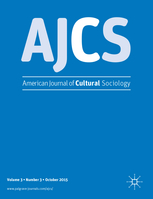For all the real-world tragedy, COVID-19 will long be prized by social scientists as a “natural experiment.” Arriving as an unanticipated exogenous shock, it has offered a unique opportunity to see how components of the social system—public health, politics, and economics most obviously—might best respond. From the perspective of cultural sociology, the pivotal opportunity for investigation is one of meaning. The emerging COVID-19 outbreak presented a novelty that was strange, disruptive, and dangerous. Could society make sense of something entirely unknown, except to the handful of super-centenarians who had witnessed the influenza epidemic in 1918? It turns out the cultural system was up to the cognitive task. [Read more here.]
Volume 8, issue 3, December 2020
The Covid Crisis and Cultural Sociology: Alone Together
11 articles in this issue
-
COVID-19 and symbolic action: global pandemic as code, narrative, and cultural performance
Jeffrey C. Alexander and Philip Smith
-
-
-
-
The “Societalization” of pandemic unpreparedness: lessons from Taiwan’s COVID response
Ming-Cheng M. Lo and Hsin-Yi Hsieh
-
The performance of truth: politicians, fact-checking journalism, and the struggle to tackle COVID-19 misinformation
María Luengo and David García-Marín
-
Covid-19 as cultural trauma
Nicolas Demertzis and Ron Eyerman
-
A virus as an icon: the 2020 pandemic in images
Julia Sonnevend
-
Art markets in crisis: how personal bonds and market subcultures mediate the effects of COVID-19
Larissa Buchholz, Gary Alan Fine, and Hannah Wohl
-
-
